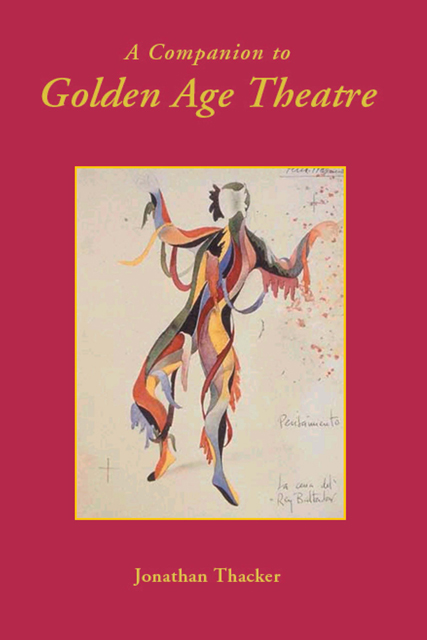Book contents
- Frontmatter
- Contents
- Dedication
- Foreword
- List of Abbreviations
- Introduction
- 1 The Emergence of the Comedia nueva
- 2 Lope de Vega
- 3 Cervantes, Tirso de Molina, and the First Generation
- 4 Calderón and the Comedia's Second Generation
- 5 Staging and Performance
- 6 Types of Comedia and Other Forms of Theatre
- 7 A Brief History of Reception
- Appendix 1 Verse Forms
- Appendix 2 English Translations of Golden Age Plays
- Suggestions for Further Reading
- Bibliography
- Index
2 - Lope de Vega
Published online by Cambridge University Press: 09 May 2023
- Frontmatter
- Contents
- Dedication
- Foreword
- List of Abbreviations
- Introduction
- 1 The Emergence of the Comedia nueva
- 2 Lope de Vega
- 3 Cervantes, Tirso de Molina, and the First Generation
- 4 Calderón and the Comedia's Second Generation
- 5 Staging and Performance
- 6 Types of Comedia and Other Forms of Theatre
- 7 A Brief History of Reception
- Appendix 1 Verse Forms
- Appendix 2 English Translations of Golden Age Plays
- Suggestions for Further Reading
- Bibliography
- Index
Summary
Lope de Vega, as we have begun to see, is the most important figure in the development of Spanish Golden Age drama, whether we ascribe to him the god-like role of creator of the comedia nueva, or whether his (instinctive?) selections were responsible for a giant step in its evolution. A separate chapter must be dedicated to him. The designation of Lope by his contemporaries as fénix de los ingenios, or monstruo de la naturaleza, helped to create an image of him as a unique, superhuman genius, an image which has proved durable in assessments of his life and work. The facts of Lope's life and literary output are extraordinary, but his myth-like status has tended to prevent scholars, perhaps especially in his native country, from challenging naive assumptions about him. In fact, as Enrique García Santo-Tomás has pointed out, the attitude to Lope which has prevailed until the present day takes the form of ‘un repertorio de clichés que se mantiene poco alterado durante casi cuatro siglos’ (La creación, p. 12). The dramatist's qualities of ‘fecundidad, espontaneidad, naturalidad o versatilidad’ have come together to operate as ‘síntomas de una esencia única de genialidad, pero también lo han hecho como paradigma de algo negativo y censurable’ (p. 11).
The double-edged praise to which Lope has been subjected has a number of overlapping explanations: (1) the legacy of early scholars, including Menéndez y Pelayo in Spain, who have helped to form the canon of his plays which are read and studied; (2) his enormous fecundity, which leads to an assumption that he dashed plays off without thinking about them and that he took all his ideas and classical knowledge from polianteas; (3) his dependence on other works, which goes hand in hand with a reputation for merely retelling old stories from history or fiction, an explanation that ignores the fashion in which he interprets his sources; (4) his apparent inconsistency, which contrasts with the much-admired Calderón, whose works have seemed to critics to form part of a unified world-view; (5) his undisciplined personal life, which has discouraged a hunt for artistic cohesion or coherence; (6) the almost complete absence of a performance tradition for his plays (in contrast to Shakespeare, for example, whose works go through different interpretations and are tested again and again on the stage); (7) his preference for the comic genre, which has traditionally been regarded as rather light-weight compared with more ‘serious’ works; and (8) a reluctance to analyse with care his own statements on his dramatic theory (e.g. in the Arte nuevo and in his prologues and dedications).
- Type
- Chapter
- Information
- A Companion to Golden Age Theatre , pp. 23 - 55Publisher: Boydell & BrewerPrint publication year: 2007



